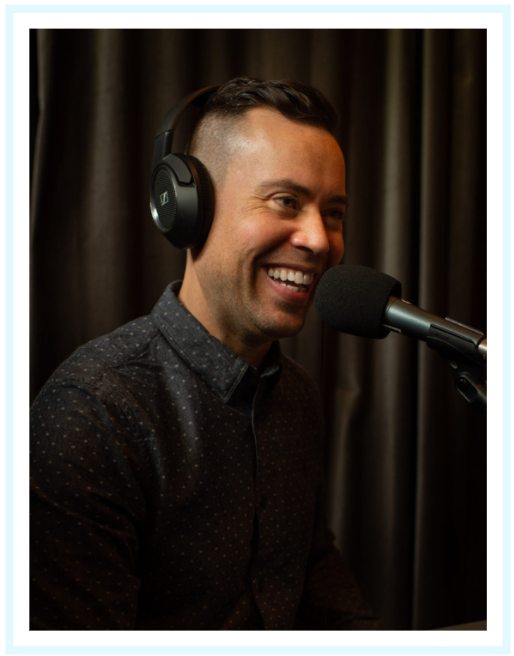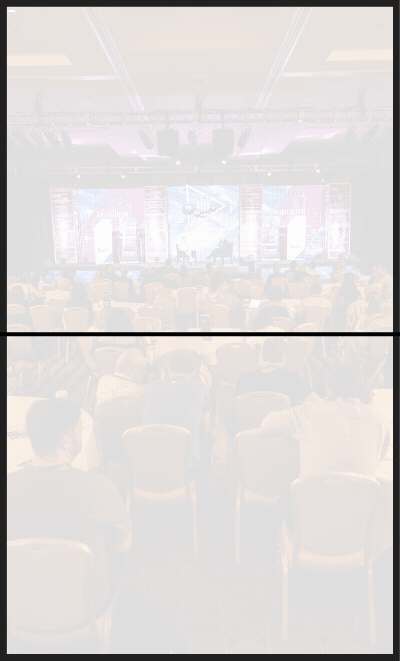I love a good host-read podcast ad, which sounds weird because who loves ads? But after writing many of them throughout my career in audio ad sales and consulting, I’ve come to appreciate the magic.
I’m referring to hosts with a certain energy I call “advertising alchemy.” That's when their words draw you into the brand story, motivate you to really listen, and maybe go to the sponsor’s website — or even make a purchase. Maybe the host’s advertising alchemy is so adept that you don’t realize for a moment that it’s an ad. (Or at least, you don’t mind.)
Today we’ll look at what it takes to make amazing host-reads and how podcasters can have more agency over the process. I investigated four podcast hosts I admire who are leaders in the industry. Every host can learn techniques from these experts to create ads that work and sponsors who return for more.

LINDSAY GRAHAM: Never Let the Script Be the Enemy of Story

Lindsay Graham (the podcaster, not the politician) is the Webby Award-winning host of American History Tellers, American Scandal, and History Daily (among others). When it comes to sponsorships, a script is just his starting point.
In an interview on The Media Roundtable with Dan Granger, Lindsay shared his approach with the Oxford Road CEO. “Whether I receive bullet points or full scripts, I use these as guideposts rather than the gospel,” he said. “Sponsors want me to tell their story in my voice and I can only do that if I take the initiative to write a script from that vantage point.”
He takes agency over the final output, keeping the listener perspective in mind. “I’ll try really hard to tell a small story or draw upon an anecdote that is universally applicable. Storytelling is imperative to these ads,” he said. “Otherwise I can read bullet points to you but I don’t know if it’s really compelling.”
Lindsay knows what all hosts can and should recognize: the value of his unique voice and style for sponsors. He extends this skill to each brand that supports him, and by taking the initiative to rewrite scripts and insert his take on the story, he shows sponsors that he’s looking out for them as well.
MALCOM GLADWELL: Extend the Content Brand to the Sponsor

I’m a fangirl of Malcolm Gladwell’s Revisionist History, plus other podcasts from Pushkin Industries. He’s quite the wordsmith, which happens to be my love language. He also has a unique speaking voice and knows something about delivery. The way he emphatically says “No!” just when I’m sure he’s going to say “Yes!” gives me goosebumps. That’s his brand.
When Gladwell did a full-on personal endorsement ad read, the results blew me away. In fact, I had no idea the segment was an ad until the end and had to replay it to figure out how he accomplished this sleight of ear. The running gear company, Tracksmith, picked the right podcaster.
He began by telling a personal story about his life as a runner, mentioning the brand only after he’d drawn me into the narrative. I learned that he was a runner in high school and abandoned it until he took it up again in his 50s to become a marathoner.
The story goes on until I learn that he can’t run without wearing a particular brand of gear and why. He transferred my affinity for his brand to the product through his immersive style of storytelling. Did I immediately buy some running gear? No! But then, I’m not a runner, I’m a swimmer.
My point is: advertising alchemy. Malcolm makes the sponsor’s story blend seamlessly with his content.
JORDAN HARBINGER: Make It Personal
Jordan does so many things right. The Jordan Harbinger Show brings in seven-figure revenue each year, and it’s easy to see why sponsors flock to his show.

For example, he has a dedicated web page for each episode to showcase that episode’s sponsors including links to the deals offered. The link to the sponsor page is conveniently published in every episode’s show notes, which he also calls out in the episode.
“I can’t think of a better way to make sure that my audience knows where to find sponsor deals,” Jordan says. “I believe it contributes to ad effectiveness and I know my sponsors appreciate it. To take it a step further, if a sponsor wanted to, they could measure how many visits they received from those links as well as from the read.”
Rarely is there an ad read without a personal comment and link to his life. He’s deft at weaving in life milestones, such as the recent birth of his daughter, which creates bonds with his listeners.
I recently heard Jordan’s read for a workout resource site and found it incredibly personal, as well as inspiring. He takes you on his journey as he struggles to find time to exercise after the arrival of his first child. What parent hasn’t been there? That relatability translates to trustworthiness.
Pay attention to Jordan’s ‘starter packs’ technique and the way he ends each episode by promoting earlier episodes. This is a brilliant strategy to generate back-catalog listening, another reason sponsors enjoy working with him. One listen to The Jordan Harbinger Show is a masterclass in advertising alchemy plus all things podcasting.
WHITNEY CUMMINGS: Humor Goes a Long Way
You’d expect Good For You to be hilarious given that Whitney is a successful comic. But making me laugh during every ad? That’s a gift. Whitney creates a rather long bit for each ad, which can run three to five minutes. It feels like a standup comedy set — she brings in her sidekicks and they riff so hard you wonder how they can pull it off without making the advertiser the butt of the joke. These are definitely not host-reads. Forget the script. These are original sketch comedies.

One of my favorites is a 3:30-long routine that begins with Whitney asking where her sidekicks are. They’re late for the recording session because they’re still in bed with their cozy Brooklinen sheets, and when they do show up, they drag the sheets along to the studio.
Typically, I’m not a fan of the extended read. At some point I expect it to end so we can get on with the content. However, in Whitney’s world, it’s another comedy segment that plays to her audience’s expectations.
An approach like this is a huge win for the advertiser, too. They get a custom Whitney bit built around their product, massive engagement, and several more minutes than any other podcast would offer.
Make me laugh at an ad? Yes, thank you. But you don’t have to be a brilliant professional comic to make it happen. If humor is part of your personality and your show, why shouldn’t it also be a part of your ad reads?
More expert tips
Now that you know how to put your personal spin on an ad read, what’s next? It’s essential to communicate effectively with sponsors and their agencies. Kathy Doyle, VP of Content Development and head of podcasting at Macmillan Publishers, is passionate about this topic. Here’s what she had to say in a recent interview with RAIN (Radio and Internet News):
“When talking points come in from a sponsor, our team really takes the time to massage them and to make sure that they sound very genuine and to work directly with the host. Sometimes we’ll even do calls with the sponsors and the agencies to just make sure we’re on track.”
Take note that not only is it a best practice to “massage” talking points and scripts, it’s all in the service of sounding “very genuine.” In the long run, a sincere and relatable delivery serves all parties — the sponsor, the host, and the audience.
Wrapping it up
At Sonic Strategy Consulting, I work with companies from all sectors of the podscape, and I especially love getting back to my roots to uncover audio advertising greatness. The key is for hosts to take agency over the process. You can and should initiate conversations to discuss personalizing scripts.
If it’s not possible to chat directly, try giving scripts a rewrite for sponsor consideration. Ask upfront how much license you have for customization. You own the final product, so why not shape it into something that will incorporate your authentic voice and make an impact with your listeners? The advertising alchemy is, ultimately, in your hands.
Whether you’re a marketer or a podcaster, I’d love to hear from you at liz@sonicstrategyconsulting.com. What challenges have you encountered with host reads and how have you managed? Have you tried any of these strategies? What have you found improves the process?



Join the Movement